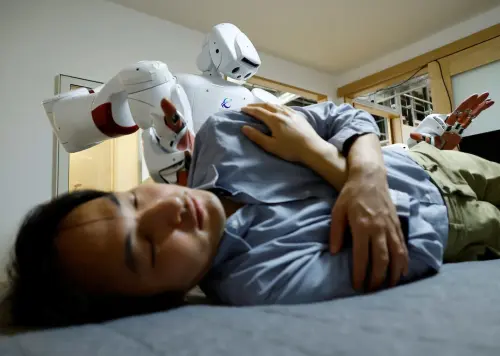In Tokyo, an AI-driven robot recently performed a caregiving maneuver by gently assisting a man onto his side, a task commonly done to prevent bedsores in the elderly. Weighing 150 kg (330 lb), the humanoid robot named AIREC is a prototype designed to aid Japan's aging population due to the scarcity of aged-care workers.
Shigeki Sugano, a professor at Waseda University leading AIREC's development, emphasized the necessity of robots in Japan's advanced aging society and diminishing workforce due to a declining birth rate. With the "baby boomer" generation reaching at least 75 by the end of 2024, the shortage of aged-care workers is exacerbated. The country's struggle to fill nursing positions is evident, with a ratio of one applicant for every 4.25 jobs available in December.
Amid efforts to address the shortage, Japan has seen a modest increase in foreign workers in the sector, amounting to less than 3% of the total workforce in 2023. While the use of technology in caregiving is being embraced, the integration of robots remains limited, with advancements largely focused on employing sleep sensors and other non-invasive monitoring technologies.
Sugano highlights the challenges of developing robots capable of safe physical interaction with humans. Although AIREC can assist with various household tasks, Sugano predicts its readiness for nursing care facilities no earlier than 2030, at an estimated cost of at least 10 million yen ($67,000) initially.
Looking ahead, Takaki Ito, a care worker, envisions a future where AI-equipped robots enhance nursing care by understanding individual needs while acknowledging the collaborative role of humans in improving caregiving services.
